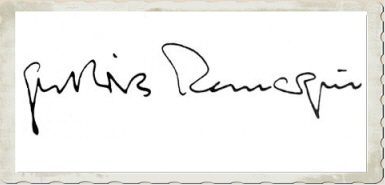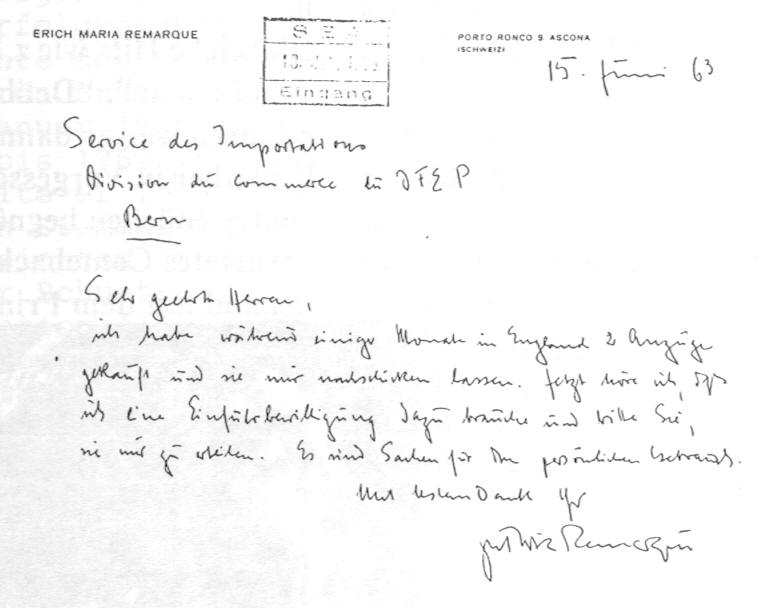| Home |
| Home |
| Mary Higgins Clark | Alexandre Dumas père | Victor Hugo | Erich Kästner |
| Gene Roddenberry | George Sand | Jaroslav Seifert | Stefan Zweig |

1898 - 1970 |
 It
is a difficult job to break down the writer Remarque in a short description.
He had all his life granted very few interviews. He slipped all his experencies
in his novels even if slight changed. He drew the line at experiences all
too private, that wasn't of the world's business. He also disdained to
describe detailed other people in his life in his novels because he found
this irreverent. He made it a rule to distribute on several characters.
By it he obtained realistic characters.
It
is a difficult job to break down the writer Remarque in a short description.
He had all his life granted very few interviews. He slipped all his experencies
in his novels even if slight changed. He drew the line at experiences all
too private, that wasn't of the world's business. He also disdained to
describe detailed other people in his life in his novels because he found
this irreverent. He made it a rule to distribute on several characters.
By it he obtained realistic characters.
Remarque belongs definitely to the most successful
German romanciers. His most successful novel - "All Quiet on the Western
front" - published in 1927, is often described as the most wide-spread
book of the world after the Bible.
His literary styles can be subdivided into the following notes: strong powers of observation, unvarnished realism, skepticism, pessimism, connected with a subliminal social engagement.
"One doesn't believe, how difficult I make it myself, to write so understandable. What you can read with easeness and - hopefully! - without any difficulties at the end, is the result of long polishment, simplification and correction. Especially if the man in the street is able to understand me, I have reached my goal".
His handwriting conveys, according to graphological points of view, a modest, even if a proud man, who is reserved as far as he is concerned.
Remarque had the nickname "Schmiere - Grease" during his service at World War I. This nickname referred to his terrible handwriting at this time. Hhis later, fine chased typeface he had to work hard for, he had to bring himself to appropriate a new writing habit.
A typical external characteristic of Remarque was that he always paid attention to exquisite dress. He always had a fashionable and elegant appearance.It is due to this circumstance that happened a little episode with the Swiss customs which resulted in the shown letter in this report (see below). This testimony shows a little insight into the everyday "worries" of a celebrity.
Remarque was born in Osnabrück as Erich
Paul Remark. His second name "Maria" he has got himself in 1922 for the
first time, which refined his name artistically.
Two years later he changed the German spelling
of his surname into the French spelling, in doing so he could base his
change on French ancestors.
Remarque had three siblings, one brother who
already died at a very early age and two sisters. His sister Elfriede,
born in 1903, was sentenced to death by the 1st Senat des Volksgerichtshofes
in 1943 as a "disgraceful fanatic subversion propagandist of our war enemies".
She was executed with an axe.
The trial against Elfriede was soaked with
emotions against Erich Maria Remarque who was in America then. The in those
days famous-notorious Nazi judge gave to understand that the sister had
also to pay for her traitor brother, who wrote the concoction "All Quiet
on the Western Front".
Remarque was called up directly from the desk
for World War I in 1917 like many of his generation. But in contrast to
the pupils who were already called up in 1914 and were enthusiastic and
full of love of adventure for the war, they were aware of the atrocities
and grief which were involved in a war.
Remarque suffered the harassments of sergeant
Himmelreich during his training, whose sadism he contributed in the character
of Himmelstoss in his antiwar novel.
Remarque was wounded at arms and neck by a
shell splinter at the first day of the outbreak of the Great Flandernschlacht
on 31st July 1917. During his stay in a military hospital died his mother.
Remarque finished his teacher training in 1919 and took on a job as a temporary worker at a primary school in the same year. How he felt his first hour as a teacher he described in his novel "Der Weg zurück":
"Embarassed and a little bit insecure I'm sitting on the teacher's desk. In front of me are sitting forty children. They are sitting at eight desks one behind the other as if aligned with a ruler. The smallest are seven years old, the oldest ten years old. The school has only three classes, therefore are several age groups joined together in each class...I'm sliding uncomfortable back and forth on my armchair. One week before I sat in the same way at a desk and looked at Hollermann's round, scraped off gestures during his speek about poets of the war of liberation. Today I have become a Hollermann myself. At least for all they below".
The profession of a teacher had never been a goal for Erich Maria Remarque. This was clearly expressed in his thoughts: "The World has only been brought forward by poor pupils".
When he gave up his profession as a teacher
he devoted to the writing with more effort . After the publishing of "All
Quiet on the Western Front" there have immediately been first enviers who
advanced claims like "The writer Erich Maria Remark doesn't exist at
all. It is not possible that this novel was written by a single person.
The name Remark you also can read backwards as Kramer, what unequivocal
points to a pen name".
| Content of the letter on the right hand
site:
Dear Sir,
|
 |
Remarque purchased his later home residence, the "Casa Monta Tabor" in Porto Ronco, in 1931, when he wasn't welcome any longer in Germany. The today multimillion dollar possession he could purchase for DM 80'000 in those days.
When he made a journey to America he met some
publishers and filmproducers. Especially Joseph Kennedy, then movie theater
owner and respected producer, father of the later president of the USA,
helped him to gain a foothold.
Tw years later he entered USA official and
got the nationality in 1947. He finished his first novel in the USA with
the title ".
But the dream and fictitious world of Hollywood became too much of a good thing and he moved his domicile to New York. In "Newsweek" he told about this city in 1957:
"I look upon New York as my home. It is an incredible city. There exists nearly everything. I am very glad to have been become an American. It is so easy here to come in contact with other people. To understand this freedom is very difficult for an European who never saw it before".
In America he met actresss Paulette Goddard and in 1958 they got married. In the period following Remarque travelled back and forth between America and Ticino in Switzerland. Only in his last years he visited the USA seldom.
Erich Maria Remarque was always weighed with a little bitterness, despite the great success and all the money he was able to earn.
"They heap honours on me, the newspaper can't stop to report sentimental things about me. But they denied my nationality in 1938. Now I even get the "Grosse Verdienstkreuz" from the President of the West German Federal Republic. But it didn't occure to him to give me back the nationality".
When he came in personal contact with Ernest Hemingway he told about him: "I am only a small man in comparison to Hemingway".
His big creative urge, the detailed accounts
of outsiders, the descriptions of the feeling of life of the post-war generations
let him go down in literature history as "Hemingway of the Germans" abroad.
Nachfolgend
eine Übersicht jener Filme, die auf seinen Büchern basieren:
-
Flotsam 1921 von Regisseur Edmund Blake mit Marjorie Battress und Dorothy
Warboys
-
All Quiet on the Western Front 1930 von Regisseur Lewis Milestone mit Louis
Walheim, Lew Ayres, Ben Alexander, William Bakewell und Slim Summerville
(basierend auf "Im Westen nichts Neues")
-
The Road Back 1937 von Regisseur James Whale mit John "Dusty" King, Richard
Cromwell, Slim Summerville, Andy Devine und Noah Beery jr. (basieren auf
"Der Weg zurück")
-
Three Comrades 1938 von Regisseur Franz Borzage mit Robert Taylor, Margaret
Sullavan, Franchot Tone, Robert Young, Guy Kibbee und Lionel Atwill
-
So Ends Our Night 1941 von Regisseur John Cromwell mit Fredric March, Margaret
Sullavan, Frances Dee, Glenn Ford, Anna Sten, Erich von Stroheim, Leonid
Kinskey, Alexander Granach, Sig Ruman und Ernst Deutsch
-
The Other Love 1947 von Regisseur André de Toth mit Barbara Stanwyck,
David Niven, Richard Conte, Gilbert Roland und Joan Lorring
-
Demir perde 1951 von Regisseur Semih Evin mit Zeynep Sirmali und Gürbüz
Bora (basierend auf "Liebe deinen Nächsten")
-
Der letzte Akt 1955 von Regisseur Georg Wilhelm Pabst mit Albin Skoda,
Oskar Werner, Lotte Tobisch, Erik Frey und Curt Eilers
-
Iz pepla 1958 von Regisseur Helmut Dziuba mit Dzhemma Firsova (basierend
auf "Die letzte Station")
-
A Time to Love and a Time to Die 1958 von Regisseur Douglas Sirk mit John
Gavin, Liselotte Pulver, Jock Mahoney, Don DeFore, Keenan Wynn, Erich Maria
Remarque, Dieter Borsche, Barbara Rütting, Charles Regnier, Dorothea
Wieck, Kurt Meisel und Agnes Windeck (basierend auf "Zeit zu leben und
Zeit zu sterben")
-
eine Episode der Serie "Teledrama: Sem Novidades no Front" 1959 mit Walter
Avancini und José Miziara (basierend auf "Im Westen nichts Neues")
-
Die Nacht von Lissabon 1971 von Regisseur Zbynek Brynych mit Martin Benrath,
Erika Pluhar, Horst Frank, Vadim Glowna, Charles Regnier, Herbert Tiede,
Peter Lühr und Tilo von Berlepsch
-
Bobby Deerfield 1977 von Regisseur Sydney Pollack mit Al Pacino, Marthe
Keller, Anny Duperey und Walter McGinn (basierend auf "Der Himmel kennt
keine Günstlinge")
-
All Quiet on the Western Front 1979 von Regisseur Delbert Mann mit Richard
Thomas, Ernest Borgnine, Donald Pleasance, Ian Holm, Patricia Neal und
David Bradley (basierend auf "Im Westen nichts Neues")
-
Arch of Triumph 1984 von Regisseur Waris Hussein mit Anthony Hopkins, Lesley-Anne
Down, Donald Pleasance und Frank Finlay
-
Der schwarze Obelisk 1988 von Regisseur Peter Deutsch mit Udo Schenk, Rainer
Hunold, Elfi Eschke, Heinz Schimmelpfennig und Werner Eichhorn
-
Tsvety ot pobediteley 1999 von Regisseur Aleksandr Surin mit Aurelija Anuzhite
und Aleksandr Nosik